Cobra Gold Exercise 2024
Bridges of Faith: Chaplain Waiyaka's Journey
"Maintain the Line: Maintain the Mind: Maintain Harmony"
Background:
Cobra Gold is an annual multinational military exercise that takes place in Thailand. The exercise involves military forces from the United States and several partner nations. The primary goal of Cobra Gold is to enhance regional cooperation and strengthen the capabilities of participating countries in responding to humanitarian crises and maintaining regional security.
Although Cobra Gold is a multinational military exercise, it often involves participants from various countries with diverse cultural and religious backgrounds. The exercise allows military personnel from different nations to interact, collaborate, and build relationships. This cross-cultural and cross-religious interaction can contribute to greater understanding, cooperation, and interoperability among the participating forces.
While the primary focus of Cobra Gold is military training and readiness, there are often elements of cultural exchange and community engagement incorporated into the exercise. For example, participants may have the chance to learn about and appreciate the local culture of Thailand through events, briefings, or community outreach activities. These interactions can help foster mutual respect and cooperation among military personnel from different backgrounds.
It's worth noting that the cultural and religious aspects of Cobra Gold Exercise may vary depending on the specific activities planned for each iteration of the exercise. Military forces participating in Cobra Gold often engage in joint humanitarian assistance and disaster relief (HADR) efforts, which may involve collaboration with local communities, further promoting cultural understanding.
Military exercises, including Cobra Gold, may involve chaplains from various religious backgrounds to support the spiritual and emotional needs of the military personnel participating. The presence of a Buddhist chaplain during Cobra Gold would align with providing religious and spiritual support to individuals who identify with the Buddhist faith.
Chaplains play a crucial role in promoting the well-being of military personnel by offering religious services, counseling, and support during challenging situations. They contribute to the overall morale and resilience of the troops by addressing their spiritual and emotional needs. In the context of Cobra Gold in Thailand, where Buddhism is the predominant religion, having a Buddhist chaplain could be particularly meaningful for military members who adhere to the Buddhist faith. This would demonstrate an understanding and respect for the cultural and religious diversity of the participating forces.
The specific details regarding the presence of religious personnel (Chaplains) during Cobra Gold may vary from year to year. In the future, I would like to see chaplains from our partners to participate in this training. Promoting interfaith dialogue and collaboration among chaplains of different religions during military exercises like Cobra Gold is a commendable initiative. Such efforts can contribute to fostering understanding, respect, and unity among the diverse group of military personnel participating in the exercise.
The U.S. Army Chaplain (Buddhist) boot on ground for harmony
During my one week mission as a spritual leader (the U.S. Army chaplain) and religious/cultural ambassador in Thailand, I had the opportunity to provide ministry of presence to interact with Military leaders, Soldiers from different countries, civilian contractors, Thai Buddhist chaplains, Thai people, and Thai Buddhist monks and Buddhist community. My mission was a rich and diverse experience, allowing me to engage with a wide range of individuals from various backgrounds. Providing ministry of presence in such a multicultural and multifaith setting is an invaluable aspect of chaplaincy, promoting understanding, support, and unity. I met those involved in the Cobra Gold training; American and Thai personnel including our multi-national partners, including Japan, the Republic of Korea, Malaysia, Singapore, and Indonesia. We shared ideas and listened to each other on how we can work together as a team and strengthen our relationship effectively to strengthen friendship and to promote harmony in the region.
These are my storyboards:










The Article from the U.S. Army
The Article from the Stars & Stripes
![]()
CH
(CPT) SONGKRAN WAIYAKA
(Buddhist Chaplain in the U.S. Army)
53D Transportation Battalion chaplain, I CORPS, JOINT BASE LEWIS-MCCHORD (JBLM), Washington
ร้อยเอกสงกรานต์ ไวยกา
เปรียญธรรม ๗ ประโยค ปริญญาตรี พุทธศาสต์บัณฑิต (พธ.บ.) มหาจุฬาลงกรณ์มหาวิทยาลัย รุ่นที่ ๔๓, ๒๕๔๐
ปริญญาโท Buddhist Chaplaincy, University of the West, USA
พุทธานุศาสนาจารย์กองทัพบกสหรัฐ หรือ อนุศาสนาจารย์ทางพุทธศาสนา
สังกัดกองร้อยการขนส่ง กองพลที่ ๑ ฟอรด์หลุย แม๊คคอรด์ รัฐวอชิงตัน
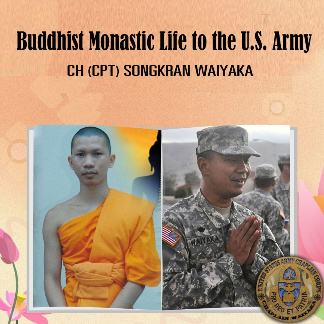

1. What’s your name and role?
I am CH (CPT) Songkran Waiyaka, a Buddhist chaplain at 53D Transportation Battalion, JBLM WA. I am responsible for tending to service members and their families' spiritual and moral well-being. My responsibilities include conducting worship services (Sunday Buddhist Service). I perform other religious ceremonies and services based on individual family's request, such as Military Funeral ceremonies and services. I lead religious/spiritual education programs such as "Spiritual Readiness Initiative" and "The Value of Life Training" to decrease the suicide rate, according to FM 7-22 chapter 10 (Spiritual Readiness). Also, I organize religious/spiritual activities such as Interfaith Prayer Breakfast/Luncheon and staff Ride to the Buddhist community to allow Soldiers to experience the Asian Buddhist culture as a cultural awareness. I provide seminars at least twice a year based on the budget, including combat stress support and advising commanders on religious and moral matters. I have an essential role in the Commander's program for operational stress control and CMRP (Command Master Religious Plan) to promote spiritual readiness based on the Army Readiness H2F (Holistic Health and Fitness; Physical readiness, Spiritual Readiness, Mental Readiness, Sleep Readiness, and Nutritional Readiness). I lead Muay Thai Yoga and Mindfulness PT (Physical training) for Soldiers every Friday to promote holistic fitness "mind and body." I provide pastoral counseling for service members and their families. I am not typically a licensed clinical counselor, but a pastoral counselor in many different life challenges, including work-related issues, combat stress, deployment, marriage and family, substance abuse, grief, and finance.
In addition, my role is divided into two functions: to perform and to refer. As a Buddhist chaplain, I conduct Buddhist services, funerals, weddings, etc. Regarding same-sex marriage, many Christian chaplains from different denominations cannot perform same-sex marriage ceremony according to their religious endorser. Many times, I conducted same-sex marriage ceremony to a couple because my endorser (BCA: Buddhist Churches of America) allows its Buddhist chaplains to meet the needs of those people. Also, I organize Buddhist religious holidays such as the Buddhist New Year and Buddha's Day. I cannot perform a Christian service or lead any other religious services because we have those chaplains to perform their religious services. If I cannot perform, I support them by refer Soldiers to appropriate chaplains. However, I am in the U.S. Army not only for the Buddhist Soldiers, but I am in the U.S. Army for all. Even though, I am not considered as a monk, but I keep the Buddha's policy sending monks to prorogate his teachings "Monks, you should travel to villages, towns, and cities for the benefit and happiness of all people". (Without discrimination regarding social status, race, and gender.) However, in an emergency situation in a battle field, all chaplains have to prepare to perform specific religious rites that do not belong to his/her faith tradition, such as providing the last rite (Catholic rite) for a dying Catholic Soldier.
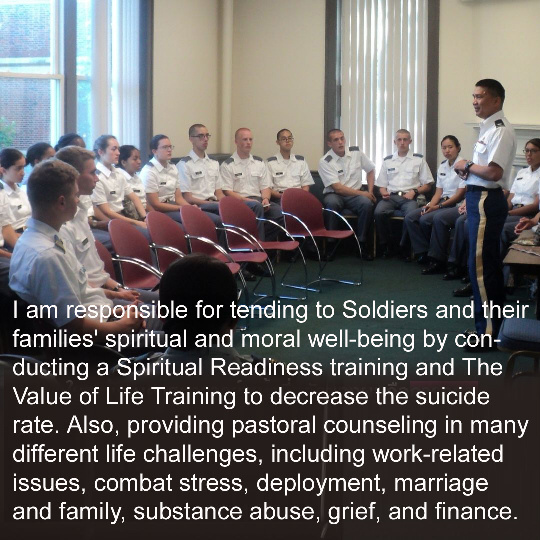
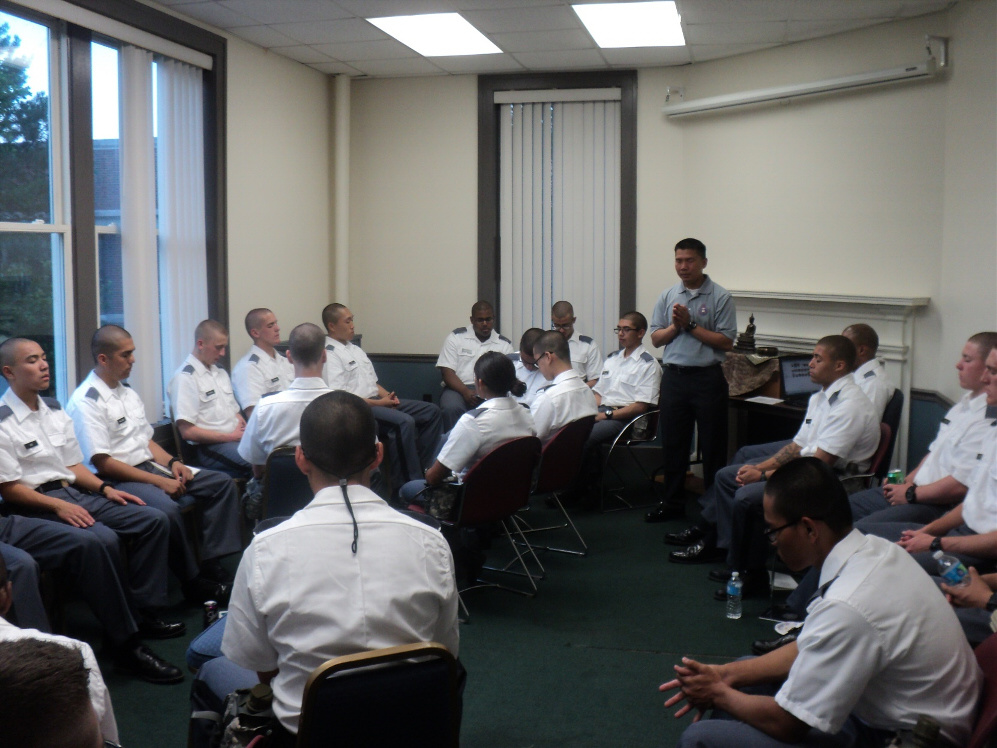
Conducted a Buddhist chanting before learning about Buddhism for cadets at West Point United States Military Academy, New York
สวดมนต์ก่อนบรรยายเกี่ยวกับคำสอนทางพระพุทธศาสนาแก่นักเรียนนายร้อย ชั้นปีที่ ๑ ที่ โรงเรียนทหารของสหรัฐ เวสต์ พ้อยต์, รัฐนิวยอรค์
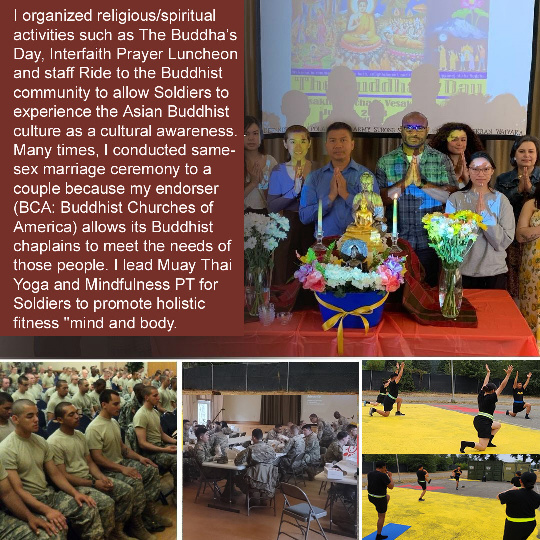
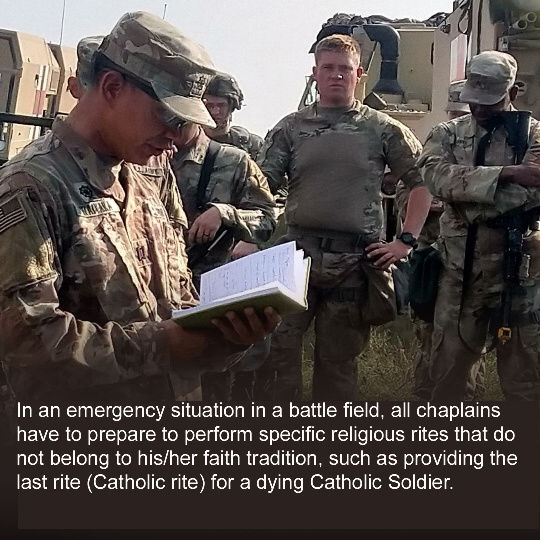
ร้อยเอกสงกรานต์ ไวยกา ทำหน้าที่เป็นอนุศาสนาจารย์ (chaplain) ของกำลังพลระดับกองร้อยการขนส่ง
ฟอรด์หลุย แม๊คคอรด์ รัฐวอชิงตัน ทีมของอนุศาสนาจารย์ก็จะประกอบไปด้วยอนุศาสนาจารย์และผู้ช่วยอนุศาสนาจารย์
หน้าที่หลักก็คือมีหน้าที่ดูแลขวัญกำลังใจและความผาสุขของกำลังพลตลอดถึงครอบครัว
ภาระหน้าที่ก็จะเป็นเรื่องของการจัดทำพิธีทางศาสนาพุทธประจำวันอาทิตย์ (Sunday Buddhist Service) ถึงแม้ว่าจะเป็นอนุศาสนาจารย์ทางพุทธศาสนา
แต่ก็ยังต้องทำพิธีให้กับทหารของศาสนาอื่นด้วย แต่ต้องได้รับความเห็นชอบของครอบครัวของทหารด้วย
เช่นทำพิธีศพให้กับทหารที่นับถือศาสนาคริส ผมทำการสอนทางศาสนาและศิลธรรม เช่น ความพร้อมทางด้านจิตใจ
(Spiritual Readiness Initiative Training) และ คุณค่าของชีวิต
(The Value of life Training) เพื่อสอนทหารให้รู้ถึงคุณค่าของขีวิต
เพื่อลดอัตราการฆ่าตัวตาย (Suicide prevention training) ตามเจตนารมณ์ของ
FM 7-22 บทที่ 10 ที่พูดถึงเรื่องความพร้อมทางด้านจิตใจ ตลอดถึงจัดกิจกรรมต่าง ๆ
ที่ช่วยส่งเสริมทางด้านจิตใจ เช่น การสวดอวยพรจากอนุศาสนาจารย์จากศาสนาต่าง ๆ และร่วมรับประทานอาหารเช้า/กลางวัน
จัดให้มีการทัศนศึกษาชุมชนพุทธเพื่อที่จะให้ทหารได้มีประสบการณ์เรียนรู้วัฒนธรรมของชาวพุทธแถบเอเชีย
และจัดให้มีการสัมนาระยะสั้น ๆ มีการสอนหรือให้คำปรึกษาให้กับทหารที่มีปัญหาความเครียดอันเกิดจากการรบหรือต่อสู้
ให้คำปรึกษาผู้บังคับบัญชาในด้านศาสนาและเรื่องขวัญกำลังใจ บทบาทที่สำคัญอีกอย่างหนึ่งคือรับผิดชอบทางด้านการส่งเสริมโครงการส่งเสริมแผนงานทางศาสนาและจิตใจของผู้บังคับบัญชา หรือที่เรียกว่า CMRP
(Command Master Religious Plan) เพื่อที่จะโปรโมทความพร้อมของกองทัพ
ที่เรียกว่า H2F ซึ่งประกอบด้วยความพร้อมทางด้านร่างกาย, จิตใจ, ความคิด, การนอนหลับ และการกินอาหารที่มีประโยชน์ ฉะนั้นทุกวันศุกร์ในฐานะที่เป็นอนุศาสนาจารย์ทางพุทธศาสนาและมีเชื้อชาติไทยจึงนำเอามวยไทยผสมผสานกับโยคะมาออกแบบในการออกกำลังกายให้ทหาร
เพื่อที่จะได้โปรโมท์ทั้งความพร้อมทั้งทางด้านร่างกายและจิตใจ ตลอดถึงให้คำปรึกษาที่ใช้หลักศาสนา
(pastoral counseling) แก่ทหารและครอบครัว
ผมไม่ใช่เป็นผู้ให้คำปรึกษาที่มีใบอนุญาตแบบทางการแพทย์
แต่เป็นผู้ให้คำปรึกษาในทางศาสนาพุทธ (เพราะว่าผมเป็นพุทธ) ในหลาย ๆ
ปัญหาที่ท้าทาย เช่น ปัญหาที่เกี่ยวกับงาน, ความเครียดจากการสู้รบ, การถูกส่งไปภาระกิจทหาร,
ปัญหาในคู่สมรสและครอบครัว, ปัญหาเรื่องการติดสิ่งเสพติด,
ความโศกเศร้าจากการสูญเสียและปัญหาการเงิน
นอกเหนือจากนั้น หน้าที่หน้าที่ของอนุศาสนาจารย์แบ่งออกเป็นสองส่วนใหญ่ คือ กระทำด้วยตัวเองและมอบหมายให้อนุศาสนาจารย์ศาสนาอื่นเป็นผู้กระทำ (Perform and Refer) ในฐานะที่ผมเป็นอนุศาสนาจารย์ทางพุทธ ผมกระทำพิธีทางศาสนาพุทธ พิธีศพแบบพุทธ และการแต่งงานแบบพุทธ เป็นต้น จะขอกล่าวถึงการแต่งงานของผู้ประสงค์แต่งงานกับเพศเดียวกัน โดยมากแล้วอนุศาสนาจารย์ทางศาสนาคริสหลาย ๆ นิกาย ไม่สามารถที่จะประกอบพิธีแต่งงานสำหรับเพศเดียวกัน ผมได้ประกอบพิธีทำการสมรสให้กับคู่สมรสเหล่านั้นได้เพราะว่าองค์กรศาสนาพุทธที่เป็นผู้ส่งเสริมอนุศาสนาจารย์พุทธในอเมริกา (Buddhist Churches of America) ไม่มีนโยบายที่จะห้ามไม่ให้มีการประกอบพิธีการแต่งงานของเพศเดียวกัน และผมเป็นผู้นำในการจัดงานสำคัญทางพระพุทธศาสนาเช่นวันปีใหม่ (Buddhist New Year) และวันอาสหบูชา (The Buddha Day)ผมไม่สามรถประกอบพิธีทางศาสนคริสได้ หรือจัดงานที่เกี่ยวกับศาสนาอื่นได้ แต่ผมช่วยสนับสนุนให้มีการจัดกิจกรรมหรือการประดับตกแต่ง เช่น ช่วงคริสมาส์ ผมก็จะประดับออฟฟิตด้วยสีสรรค์ของศาสนาคริสต์ และถ้าผมไม่สามารถทำได้ ผมต้องบอกให้ทหารให้ไปหาอนุศาสนาจารย์ตามความเหมาะสม อย่างไรก็ตาม ในสถานการณ์ฉุกเฉินในสนามรบ อนุศาสนาจารย์ทุกนายต้องเตียมตัวที่อาจจะต้องได้ทำพิธีทางศาสนาที่ไม่ได้เป็นของตัวเอง เช่น การทำพิธีเจิมเป็นครั้งสุดท้ายในการเสียชีวิต ของทหารที่นับถือศาสนาคริสนิกายโรมันแคเธลิคที่กำลังจะเสียชีวิต ผมพูดเสมอว่าก็เปรียบเสมือนหมอ ถ้าเห็นคนไข้เลือดอาบหน้ามา ด้วยจรรยาบรรณของหมอ เขาจะไม่ถามว่าคุณเป็นพุทธ คริสต์ หรืออิสลาม คือเขาจะต้องดูแลรักษาแผลหรือหยุดเลือดก่อนเป็นอย่างน้อย แล้วส่งไปให้แพทย์ที่มีความชำนาญทำการรักษาต่อไป
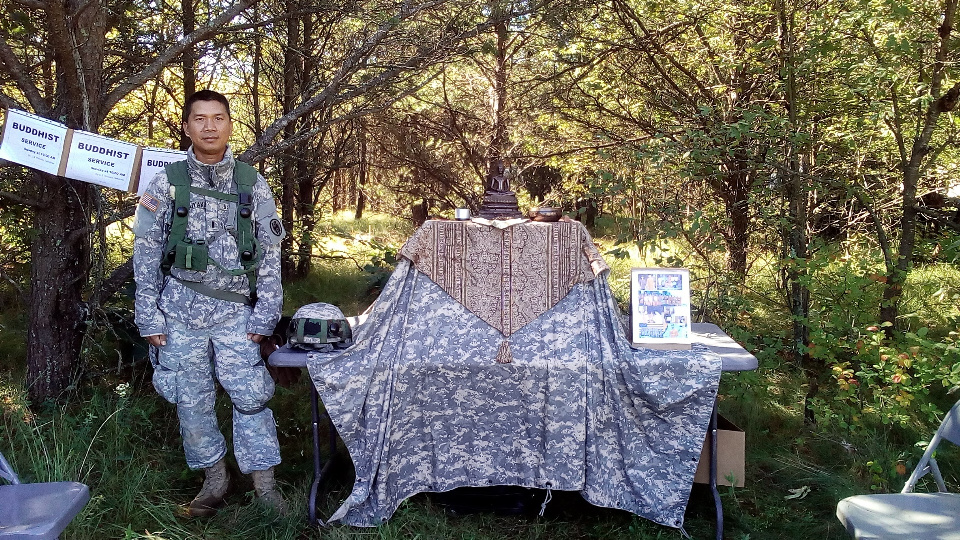

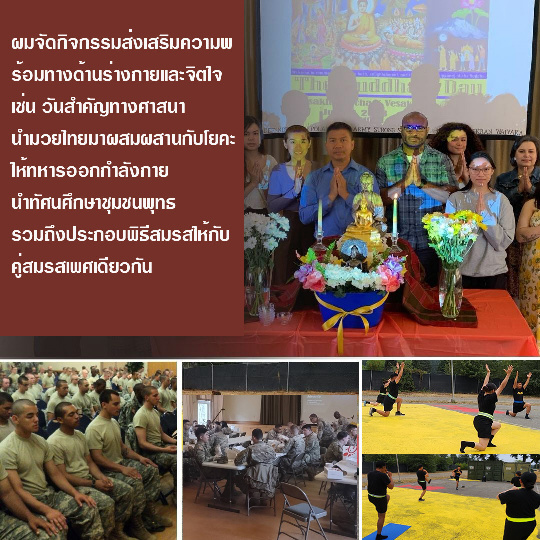

2. What drove you to pursue chaplaincy, and how did your path unfold from Thailand to the U.S. Army?
As a former Buddhist missionary monk to America, I wanted to try something that would allow me to continue my mission in a different setting. I decided to join the U.S. Army as a Buddhist chaplain because challenging by using Buddhism as my guidance. This transition allows me to provide spiritual support and advice to individuals from diverse religious backgrounds. I look forward to contribute my experiences and skills in a non-religious setting for the benefit of all people.
I chose the U.S. Army as a platform to share Buddhist values and support American soldiers because the military environment, with its unique challenges and stresses, can benefit significantly from the principles of mindfulness, compassion, and resilience that Buddhism often emphasizes. This journey from a monastic life in Thailand to a chaplaincy role in the U.S. Army reflects adaptability, commitment to service, and bridging cultural and religious differences.
ในฐานะที่เคยเป็นพระธรรมทูตสายต่างประเทศในประเทศสหรัฐอเมริกา ผมต้องการทำสิ่งที่แตกต่างจากพระ ที่ผมสามารถทำในสิ่งที่ผมเคยทำมา แต่ในสภาพแวดล้อมที่แตกต่างจากวัด ผมจึงตัดสินใจเข้ามาเป็นทหารของกองทัพบกสหรัฐในฐานะอนุศาสนาจารย์ เบื้องหลังของการตัดสินใจนี้ก็คือความท้าทายในการใช้พระพุทธศาสนาเป็นแนวทาง การเปลี่ยนแปลงในครั้งนี้ทำให้ผมได้ทำหน้าที่ให้การสนับสนุนทางด้านจิตใจและคำปรึกษาแก่ผู้คนหลากหลายศาสนา ผมถือว่าโอกาสอันนี้เป็นการมอบประสบการณ์และความสามารถของผมในสิ่งแวดล้อมที่ไม่ได้เป็นศาสนสถานเพื่อประโยชน์และความสุขของคนหมู่มาก
ผมเลือกกองทัพบกสหรัฐเป็นที่สมรภูมิที่จะแบ่งปันคุณค่าทางพระพุทธศาสนาและให้การสนับสนุนทางด้านจิตใจแก่ทหารอเมริกัน เพราะว่าสมรภูมิของทหารที่มีแต่ความท้าทายและความตึงเครียดสามารถที่จะได้รับประโยชน์จากหลักคำสอนทางด้านสติหรือสมาธิความเมตตาปราณีตลอดถึงการฟื้นลุกขึ้นมาอย่างเข้มแข็งได้ เหมือนอย่างที่ทางคำสอนทางพระพุทธศาสนากล่าวถึงอยู่เสมอ การดำเนินชีวิตของผมจากการเป็นพระในเมืองไทยมาสู่บทบาทหน้าที่ของอนุศาสนาจารย์ในกองทัพบกสหรัฐ บ่งบอกถึงการปรับตัว ความมุ่งมั่นที่จะรับใช้สังคม และตลอดถึงการเชื่อมต่อความแตกต่างทางด้านวัฒนธรรมและศาสนาเข้าหากันได้อย่างลงตัว
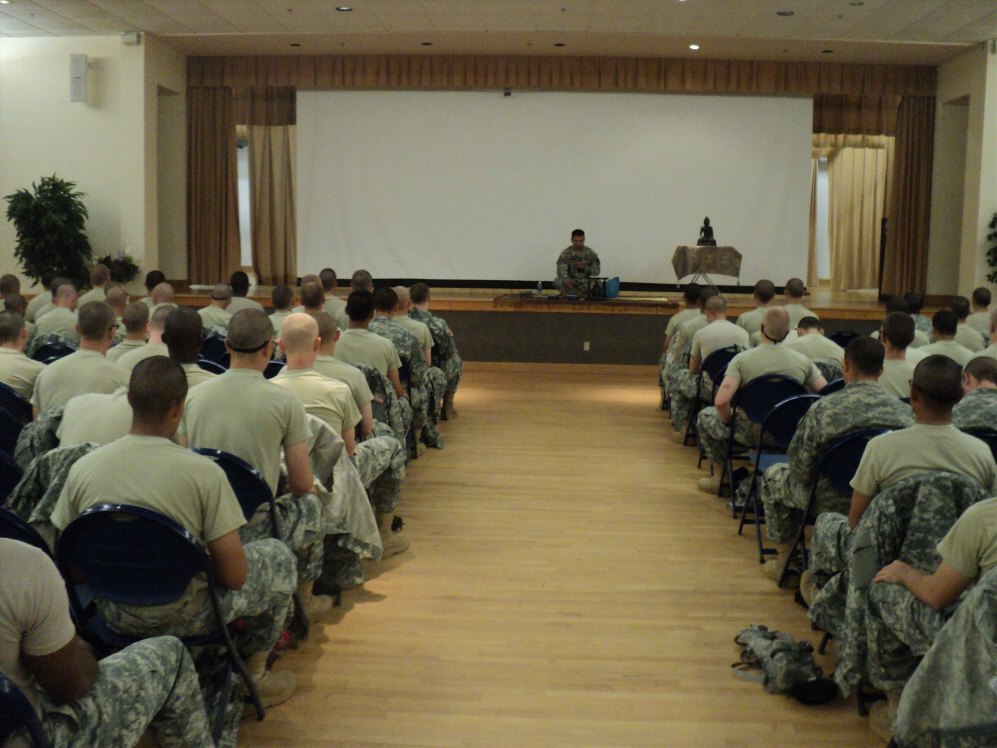
During my training as the Army chaplain at Fort Moore, Georgia (formerly Fort Benning). Introduced secular mindfulness for Soldiers to overcome many different life challenges including work-related issues, combat stress, deployment, marriage and family, substance abuse, grief, and finance.
ในระหว่างการฝึกสอนการเป็นอนุศาสนาจารย์ แนะนำทหารให้รู้จักการใช้สติในการทำงานและในชีวิตประจำวัน เพื่อจะได้นำมาใช้เวลามีความทุกข์ อันเนื่องมาจากหลายสาเหตุ เช่น ปัญหาที่เกี่ยวกับงาน, ความเครียดจากการสู้รบ, การถูกส่งไปภาระกิจทหาร, ปัญหาในคู่สมรสและครอบครัว, ปัญหาเรื่องการติดสิ่งเสพติด, ความโศกเศร้าจากการสูญเสียและปัญหาการเงิน
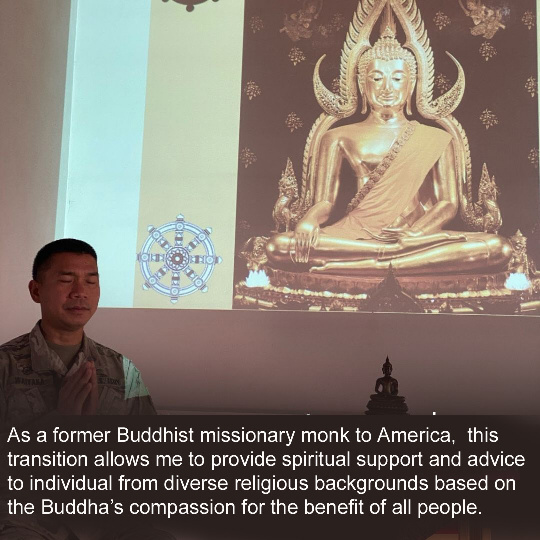

3. What are the key differences between monks and chaplains?
There are many critical differences between Buddhist monks and Buddhist chaplains. The monk observes the monastic 227 disciplines, while a chaplain or a lay Buddhist minister observes 5 precepts. The monk cannot do certain things as the layperson does. The monk in Thailand cannot join the Military unless he renounces his monkhood as a lay person. Therefore, former Buddhist monks like me and many other Buddhist chaplains in Thailand joined the Military as Buddhist chaplains because they are experts in culture and religious services\ ceremonies.
ความแตกต่างระหว่างพระภิกษุกันอนุศาสนาจารย์มีด้วยกันหลาย
ๆ อย่าง อย่างแรกก็คือพระภิกษุรักษาศิล 227 ข้อ ส่วนอนุศาสนาจารย์หรืออุบาสกรักษาศิล
5 พระภิกษุไม่สามารถทำกิจหลาย ๆ อย่างแบบฆราวาสหรือชาวบ้านได้
พระภิกษุในประเทศไทยไม่สามารถเข้ามาเป็นทหารได้
จนกว่าท่านลาสิกขาบทมาเป็นฆราวาสหรือชาวบ้านทั่วไป ดังนั้น
ผู้ที่เคยบวชเรียนเป็นพระภิกษุมาดังเช่นตัวผมเองและหรืออนุศาสนาจารย์ชาวพุทธในเมืองไทยจึงเข้ามาเป็นทหารในฐานะอนุศาสนาจารย์ทางพุทธศาสนา
เพราะว่าพวกเขาเหล่านั้นถือว่าเป็นผู้ที่มีความรู้ความสามารถในการประกอบพิธีกรรมทางพระพุทธศาสนาและมีความเข้าใจวัฒนธรรมไทยพุทธ
4. Describe an event where you felt most
fulfilled while performing your duty as a chaplain?
Spiritual fitness is my scope of practice to ensure our Soldiers are fit spiritually. I fulfilled my experiences to develop spiritual fitness for my Soldiers using a simple Army Monday Motor Pool model for a self-checkup. It makes sense for them because they use this concept all the time. What do I mean by this analogy? Every Monday, Soldiers conduct MPCS (Preventive Maintenance Checks & Service) at the motor pool to ensure their vehicles work and are ready for mission. Soldiers must check their cars page by page before, during, and after to ensure their vehicles work. They must inspect the engine, interior, exterior, underneath, etc. If they find any fault, they must record it on the DA Form 5988 to notify the mechanic to fix the issues. Therefore, I developed a training called Mindfulness. I don’t want to use the term “Meditation” because it sounds religious. I guide them to scan their body from head to toe to observe their mind and body reactions. The reason behind this training is to ensure that the Soldier looks into individual life physically, mentally, and spiritually. If they find any issues physically, mentally, and spiritually, they have to notify the mechanic (Medical doctor/chaplain) to fix the problems. This training helps Soldiers identify their own holistic health and fitness. I am happy to introduce this non-religious training for my Soldiers.
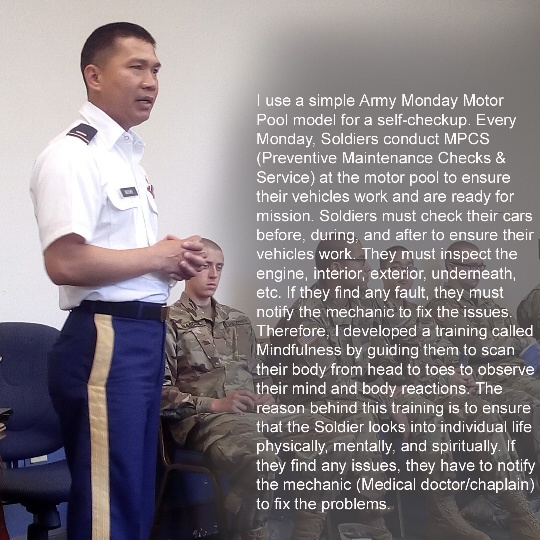
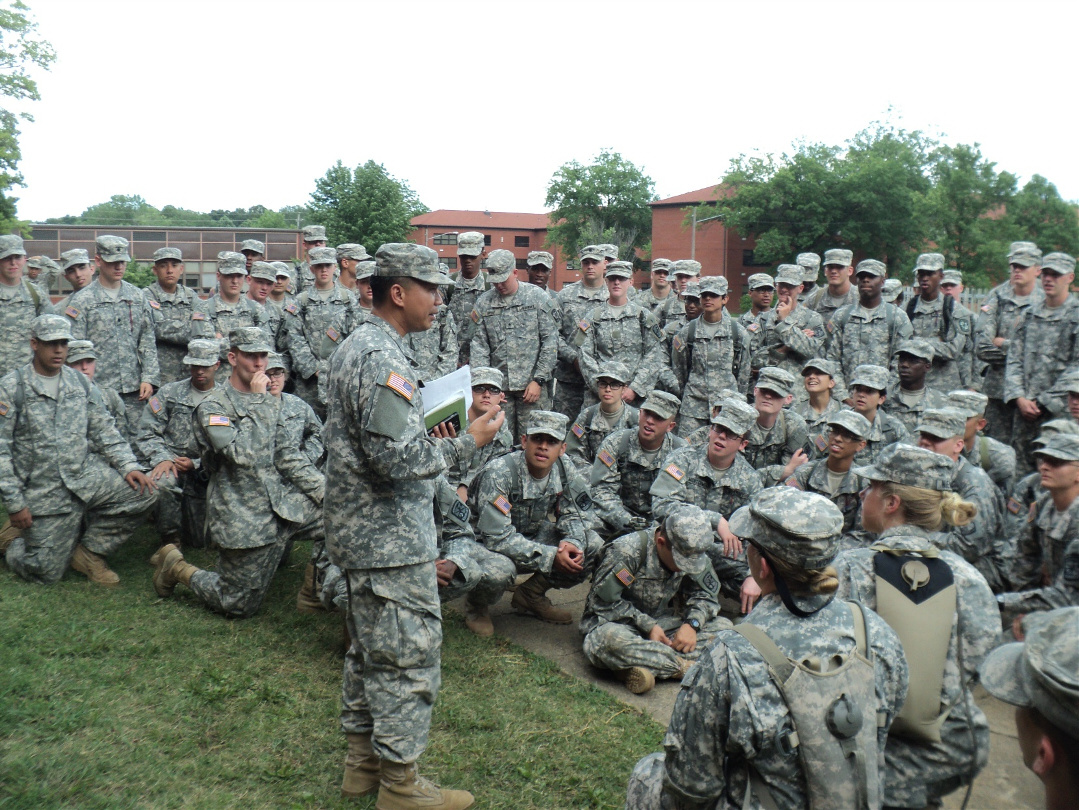
During my training as the Army chaplain at Fort Knox, Kentucky. Conducted the field ministry of present for ROTC Cadets (6the Regiment)
ในระหว่างการฝึกสอนการเป็นอนุศาสนาจารย์ พบปะพูดคุยกับนักศึกษาวิชาทหาร (ร.ด) จากกรมกองทหารที่ ๖ ที่ Fort Knox, Kentucky
หน้าที่ผมคือทำให้ทหารมีความพร้อมทางด้านจิตใจ สิ่งที่ทำให้ผมรู้สึกว่าบรรลุเป้าหมายก็คือผมใช้ประสบการณ์ที่จะพัฒนาความพร้อมทางด้านจิตใจสำหรับทหารด้วยการใช้วิธีการของการเช็คความพร้อมของยานพาหนะคือรถฮัมวี่ ซึ่งถือว่าเป็นกิจวัตร์ประจำวันจันทร์ก็ว่าได้ ให้มาเป็นการเช็คความพร้อมของตัวเอง มันเป็นวิธีการที่เห็นได้ง่ายเพราะเขาใช้วีธีนี้เป็นประจำอยู่แล้ว ลองมาดูว่าผมใช้การอุปมาอย่างไร ทุก ๆ วันจันทร์ ที่ลานจอดรถ ทหารก็จะทำการตรวจเช็คเครื่องไม้เครื่องมือที่อาจจะเกิดความผิดพลาดก่อนที่จะนำไปใช้งาน เขาต้องเช็คดูรถก่อนสตาท์เครื่องยนต์ ระหว่างติดเครื่องยนต์ และหลังจากหยุดเครื่องยนต์ อย่างละเอียดแบบหน้าต่อหน้าคู่มือ เขาต้องตรวจเช็คเรื่องยนต์ ด้านในรถ และนอกรถตลอดถึงใต้ท้องรถ เป็นต้น ถ้าเขาพบเจอสิ่งผิดปกติก็ต้องจดบันทึกไว้ในแบบฟอรม์ DA 5988 เพื่อที่จะแจ้งให้ช่างชำนาญเฉพาะให้ทำการซ่อมปัญหานั้น ๆ ดังนั้น ผมจึงได้พัฒนาการฝึกที่เรียกว่าความรู้ตัวตนหรือจะเรียกว่าการมีสติหรือสมาธิก็ได้ ที่ไม่ได้เรียกว่าสมาธิมันจะดูเป็นเรื่องของศาสนาจนเกินไป ผมให้ทหารสอดส่องตัวตนจากหัวจรดเท้าเพื่อที่จะได้เช็คดูว่าร่างกายและจิตใจเป็นอย่างไรเมื่อเขาได้รับอารมร์จากสิ่งภายนอก (ทางตา หู จมูก ลิ้น กาย และใจ) เหตุผลที่ให้ทำแบบนี้ก็คือให้ทหารได้ตรวจเช็คตัวเองทั้งทางด้านร่างกาย ความรู้สึกนึกคิดและสภาพจิตใจ ถ้าหากเขาพบสิ่งที่ผิดปกติทางร่างกาย ความรู้สึกนึกคิด และสภาพจิตใจ ก็ให้เขาแจ้งให้หมอ หรืออนุศาสนาจารย์ได้ทราบ และหาทางเยียวยารักษาต่อไป การฝึกตรงนี้ช่วยให้ทหารได้รู้ถึงความพร้อมทางด้านร่างกายและจิตใจ เป็นสิ่งที่ผมภูมิใจที่ได้แนะนำวิธีนี้โดยที่ไม่ได้เกี่ยวข้องเรื่องศาสนาเลย แต่เป็นสิ่งที่เขาทำเป็นกิจประจำวันอยู่แล้ว

5. How do you integrate Thai culture and Buddhism into your chaplaincy?
In general, the Thai people and culture are flexible and friendly. Also, the nature of Buddhism is flexible, peaceful, and adaptable. Therefore, this combination perfectly fits my chaplaincy in the U.S. Army. As a former Buddhist monk, I understand Thai culture and Buddhism, including the American and Army cultures. I use my Thai cultural background and Buddhist identity to work well with my superiors and subordinates with respect, friendliness, and humility. It is essential to self-awareness and understanding others. However, I use my friendly personality and smile to interact with people. As part of the community, I share Buddhist values to benefit Soldiers.
โดยทั่วไปแล้วคนไทยและวัฒนธรรมไทยเป็นผู้ที่มีความโอนอ่อนผ่อนตามและมีความเป็นมิตร และธรรมชาติของศาสนาพุทธก็มีความโอนอ่อนผ่อนตาม, สงบ และปรับให้เหมาะสมได้อย่างลงตัว ดังนั้น การประสมประสานนี้จึงถือว่าสมบูรณ์แบบลงตัวในสายงานอนุศาสนาจารย์ของผมในกองทัพบกสหรัฐ ในฐานะที่เป็นอดีตพระมาก่อน ผมเข้าใจวัฒนธรรมไทย, พระพุทธศาสนา ตลอดถึงวัฒนธรรมอเมริกันและวัฒนธรรมทหารอเมริกัน ผมจึงใช้พื้นฐานทางวัฒนธรรมไทยและอัตลักษ์ของความเป็นชาวพุทธ เพื่อที่จะได้ทำงานกับผู้บังคับบัญชาและผู้ใต้บังคับบัญชาด้วยความเคารพยำเกรงด้วยความเป็นมิตรและถ่อมตน การที่เรามีความเข้าใจกันและกันถือว่าเป็นสิ่งที่สำคัญในการตระหนักรู้ตัวตนและคนอื่น อย่างไรก็ตาม ผมใช้อุปนิสัยที่เป็นมิตร ด้วยความยิ้มแย้มแจ่มใส่ในการปฏิสัมพันธ์กับผู้คนทั่วไป ในฐานะเป็นส่วนหนึ่งของชุมชน ผมได้แบ่งปันคุณค่าทางพระพุทธศาสนาเพื่อให้เป็นประโยชน์ต่อทหาร พร้อมกับเพื่อนอนุศาสนาจารย์จากศาสนาต่าง ๆ
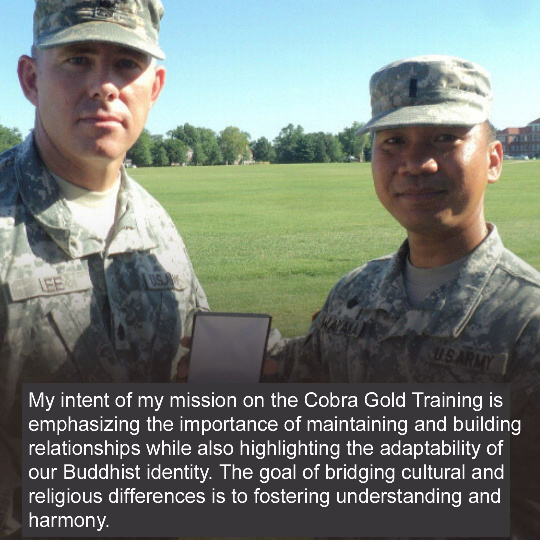
6. One interesting fact about chaplaincy on the top of your head?
The interesting aspect of chaplaincy is its adaptability to diverse cultural and religious contexts. Chaplains often receive training to be culturally competent, allowing them to effectively engage with individuals from various backgrounds. This adaptability helps me to address the spiritual and emotional needs of a diverse range of people.
มุมมองที่น่าสนใจของงานอนุศาสน์ ก็คือการปรับตัวให้ถูกกับวัฒนธรรมและเนื้อหาทางศาสนาที่มีความหลากหลาย โดยปกติอนุศาสนาจารย์ได้รับการฝึกฝนมาให้มีความรู้และเข้าใจทางวัฒนธรรมอยู่แล้ว มันจึงทำให้อนุศาสนาจารย์มีความเอาใจใส่กับผู้คนจากหลากหลายวัฒนธรรม การปรับตัวได้นี้ ช่วยให้ผมได้บ่งบอกถึงความต้องการทางด้านจิตใจและความรู้สึกจากผู้คนที่มาจากหลายวัฒนธรรมได้เป็นอย่างดี
